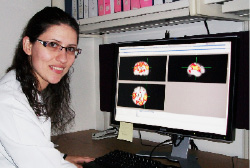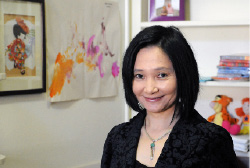Spotlighting New Faculty
TC's new faculty members Georgia Malandraki and Hansun Zhang Waring share their perspectives on their research and teaching
Georgia Malandraki Assistant Professor of Speech and Language Pathology
What do you teach?
This semester, I’m teaching a course in dysphagia, or swallowing disorders that result from problems with any of the 50 muscles and many nerves involved in moving food from the mouth to the stomach. Dysphagia is especially common among older patients and those who have had a stroke. In the future, I will also be teaching courses in Voice Disorders and Disorders of Fluency.
What has been the focus of your research?
My research focuses on advanced neuroimaging applications. My work has focused on the use of functional magnetic resonance imaging (fMRI) for capturing the neural control of swallowing in healthy young and older adults, as well as identifying the effects of swallowing treatments on neural activity and swallowing physiology in normal and disordered populations.
Recently, I was awarded a grant from the Wisconsin Alzheimer’s Disease Research Center and the National Institute of Aging to study the effectiveness of sensory stimulation on swallowing physiology and neural activation in healthy older adults and patients with mild Alzheimer’s Disease.
What are your academic passions?
Speech and language pathology is such a magical field, providing the gift of communication and eating to those who have lost the ability to do so. Being able to help people communicate and even survive is very rewarding. I take immense joy in trying to transfer my passion for this field to my students.
Who has been influential in the development of your interests and/or career?
My nephew Telemachus, who is ten years younger than me, has borderline autism and hyperactivity disorder. We practically grew up together in a small city in Greece. After witnessing my nephew’s journey and struggles, I became inspired to help people like him.
Hansun Zhang Waring Assistant Professor of Applied Linguistics and TESOL
What do you teach?
I teach Conversation Analysis, Advanced Conversation Analysis, Discourse Analysis, and Doctoral Seminar in Discourse.
What has been the focus of your research?
I am broadly interested in language and social interaction. As a discourse analyst, I work to accurately describe language use in both ordinary conversations and institutional settings such as the classroom. This means spending hours listening to, watching, transcribing and analyzing audio/video recordings of people talking to each other, taking note of minute details such as pauses and the slightest rise in pitch. In doing such micro-analytic work, I begin to get answers to questions such as “How is advice giving and receiving done?” or “How does teacher talk promote or hinder learning?” Using the high-powered lens of conversation analysis, I have examined ordinary conversations, graduate seminar discussions, and peer tutoring sessions. More recently, I have been looking at instructional practices in an after-school literacy program and adult ESL classrooms.
What are your academic passions?
I take great pleasure in analyzing the details of interaction. By delving into what initially appears to be meaningless minutia in social interaction, we often gain immense insights into humanity. The unfocused child turns out to be keenly purposeful, the rambling tutee turns out to be making delicate competence assertions, and the uneventful classroom turns out to be rife with burning questions and unresolved understandings. The joy of teaching, for me, is helping my students cultivate the same appreciation for details and experience the same thrill of discovery so that they too can “see a world in a grain of sand,” as so aptly captured in William Blake’s words. I recently created LANSI (Language and Social Interaction Working Group) in part to develop an apprenticeship model where doctoral students work alongside practicing analysts to notice details and make observations about social interaction.
Published Monday, Nov. 22, 2010

